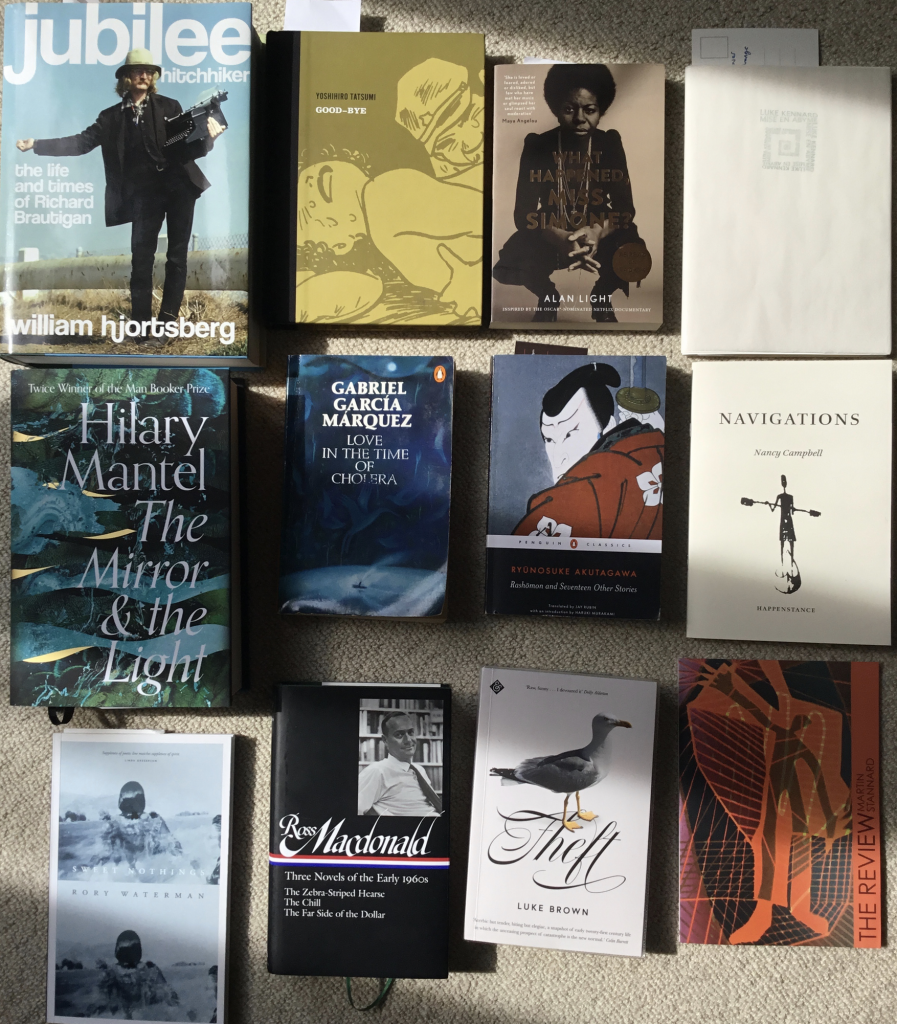Easter Lockdown Reading, April 2020

Normally at this time of year, I write about my holiday reading on my blog. This year, while I haven’t had a holiday, I’ve done loads of reading, if not in quite the same way. So here’s this Easter’s reading, which I’m also sharing on the Nottingham UNESCO City of Literature website.
Nearly everyone I know is having trouble concentrating for long periods. A case in point. I have a long standing reading rule which is: when I’m not enjoying a book after fifty pages, I give up on it, if I haven’t already, but if I get past the fiftieth page, I always finish it. The first week of lockdown, I broke this rule, pausing my reading of Hilary Mantel’s The Mirror and the Light. I’d finished a section and was 400 pages in, with 500 to go. I liked the previous two a great deal, but this one had become a slog, even after I’d got all of the names sorted out in my head. Probably the times we’re in, but there was nothing I was waiting to find out (I know the history well, having set one of my novels in the immediate aftermath of Henry’s reign). And 400 pages is well over the length of the average literary novel. There’ll be plenty of time to return to the other 500 in the endless months ahead. Maybe next week.
Instead, I picked up a novel I’ve been meaning to read for more than thirty years (since 1989, in fact, when my sister Fran gave it to us for Christmas), Gabriel Garcia Marquez’s Love in the Time of Cholera. I’d enjoyed Chronicle of a Death Foretold but had to put down One Hundred Years of Solitude because I couldn’t keep track of all the names. This one is a remarkable novel, set over the best part of a century, throughout which a cholera epidemic rages. It’s a love story, albeit one laced with perversion, cheating, obsession, casual sex (it’s very much a pre me-too novel) and the history of a fictional Caribbean country (probably based on Colombia). To say much more would only offer spoilers, but it’s an absorbing, beautifully written and translated story that veers off in surprising directions yet remains tightly organised in every sense, with a vivid sense of place throughout. It provided me with a useful means of escape, and a reminder that long lasting pandemics are a frequent occurrence in human history.
Luke Brown’s second novel, Theft, set in London and Fleetwood, is a coming of age after the death of a parent story which is a lot more entertaining than that makes it sound. My new novel of the year, The Second Sleep, is the latest from Nottingham (he grew up on a council estate) author, Robert Harris. How a novel set in 1486 can turn out to have more contemporary relevance than anything else you’re likely to read this year, I’ll leave it to you to discover. I generally prefer Harris’s historical novels to his contemporary ones, but the last two were mildly disappointing (one about Dreyfus, the other about Munich – I see he’s returning to the second world war with his next novel, too). But I would argue that this is his best book by a long chalk. I managed to pass it on to writer James Walker during our weekly clap for the NHS, hence it’s not in the picture (he lives opposite us) and he was equally enraptured. Indeed, at last night’s clap he passed it on to my next door neighbour, Helen. Must be out in paperback soon. The less you know about the plot before reading it, the better. Get it.
Blogs & social media posts are often the most interesting way of finding out what’s happening in the now and my favourite daily read of this nature has been Brian Lewis’s accounts of his walks around Sheffield (where I was born, and where my sister and younger brother live) delivering books for Longbarrow Press (one of the UK’s most interesting poetry publishers). This is both a portrait of the deserted city under lockdown and a memoir of becoming a poetry publisher, in a style that reminds me of BS Johnson at his best (The Unfortunates, Trawl). He’s just finished the series, after 30 days, and all of his posts can be found on the Longbarrow Press blog.
One of my favourite poets is Martin Stannard, whose poetry blog, Elephants, is updated daily with amusing, intriguing, occasionally surreal snippets. Martin posted me a copy of his new long poem (available from Knives, Forks and Spoons Press) The Review, which is a stonking, funny, thought provoking, entertaining 48 page poem. Highly recommended. And yes, Martin’s been a friend for more than 30 years, but I was a fan of his work before I met him, and I still am (not always easy to enjoy the work in the same way when you know someone well). Rory Waterman is also a friend and a colleague (I teach Creative Writing part time at NTU). His third collection Sweet Nothings is being reviewed for the City of Lit site, so all I’ll say is that I’m halfway through and enjoying the collection a great deal. He’s in a different tradition to Martin (Rory’s a Larkin aficionado and there are occasional echos) and a generation younger. I bought his book direct from Carcanet where you can get 25% off at checkout with the code WATERMAN25 until May 28th. Do support small presses in these times, and independent bookshops like Five Leaves in Nottingham. Had things been different, we’d be there for launches with Rory, Martin and Matthew Welton, whose Squid Squad is my next read. I’ve just seen that Luke Kennard (whose excellent new book of prose poems I’m also reading) is introducing Matt’s launch online on May 6th.
On holiday, I read one book at a time, but at home I usually have two or three on the go (even more so at the moment), not just poetry collections (I’m also enjoying Nancy Campbell’s new Happenstance pamphlet, taken from her time as Canals laureate & bought direct from them) but short story collections (eg Rashomon, shown above), comics or graphic novels (the anthology by Tatsumi pictured is an old favourite that I’m rereading) several books about music that I dip in and out of (the Nina Simone one above being one of them). I’m slowest at reading biographies, and have been known to give them to Oxfam at the point where I run out of space and have to acknowledge that I’ll never start them. I began William Hjortsberg’s leave-nothing-out Jubilee Hitchhiker: The Life and Times of Richard Brautigan a couple of years ago. It’s a vast book, eight hundred large pages of close type (and that’s not counting the notes or index). The first long section is a detailed account of the author’s suicide. Then it moves to the early years and his incarceration in mental hospitals. I got through the first, but got bogged down. Now I’m through the early misery and he’s married, living in San Francisco, working on his first novel. This’ll probably turn out to be the most interesting section. I’ve got a feeling I’ll finish the book this time. Hjortsberg was a friend of Brautigan’s and has died since I started reading the biography. He writes well and gives good accounts of everyone Brautigan knows as well as more minutiae about the writer’s life than most of us would ever need. His book’s a reminder that all biographies are infinitely expandable, to The Mirror and the Light length and beyond.
Which brings us back to where I started. My bedtime reading is by Ross MacDonald, one of the greatest American mystery writers, whose novels I’ve decided to read (in many cases re-read) in chronological order. I’m up to the early 60s and a beautiful Library of America omnibus that begins with The Zebra-Striped Hearse, not one of his very best, but, as always with him, beautifully written and tightly, cleverly, clearly plotted. Think Scott Fitzgerald meets Raymond Chandler but without the latter’s sloppy plots. And there are two more novels in the volume which, at two or three chapters a night, should see me through to June. Happy reading, all.
